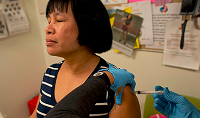 |
| Courtesy of C.J. Gunther, European Pressphoto Agency |
The reluctance of some parents to vaccinate their children in the U.S. has been in the spotlight this year, with a measles outbreak at Disneyland and the California government striking down exemptions to vaccination requirements for children. But the WHO says that vaccine hesitancy is a worldwide problem.
Worldwide, 1.5 million children die each year of vaccine-preventable diseases and 1 in 5 children does not get routine immunizations, the WHO says. In a special issue of the journal Vaccine, researchers discussed the role of vaccine hesitancy in limiting vaccine uptake as well as strategies to address it.
The WHO defines vaccine hesitancy as delay in acceptance, or refusal, of safe vaccines despite the availability of vaccination services. Experiences from polio immunization schemes in Nigeria and India showed that vaccine hesitancy and mistrust or rejection of vaccines "are global issues that threaten to undermine decades of progress," the authors wrote in the introduction to the issue.
The authors found that strategies focusing on awareness and knowledge of vaccines are important, but inadequate. The most effective interventions for vaccine hesitancy used a multifaceted approach, they wrote. In a study, the most effective strategies incorporated directly targeting under- or unvaccinated populations, mandated vaccines or sanctioned against nonvaccination, improved convenience and access to vaccines and engaged influential leaders in addition to increasing vaccine awareness. The least effective strategies were passive ones: using posters and websites to target vaccine hesitant populations.
And while previous efforts to quell vaccine hesitancy and mistrust have focused on individual issues--awareness--and vaccine-specific issues--mode of delivery, risks--these efforts don't address other determinants of vaccine hesitancy. The authors highlighted a need to address hesitancy at the community level and the social network level.
"As the recent Ebola crisis tragically brought to light, engaging with communities and persuading individuals to change their habits and behaviors is a lynchpin of public health success. Addressing vaccine hesitancy is no different," the authors wrote. People have been trying to combat challenges to vaccine uptake for years. By 2009, the WHO's Strategic Advisory Group of Experts on Immunization highlighted the need to address "misinformation propagated by increasingly vocal and sophisticated anti-vaccine movements, particularly in Europe" in a more methodical and proactive way.
- here's the WHO release
- access the special issue of Vaccine here